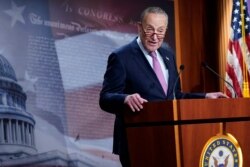U.S. lawmakers are nearing agreement on an almost $750 billion aid deal addressing the economic impact of the coronavirus.
“We made major headway toward hammering out a targeted pandemic relief package that would be able to pass both chambers with bipartisan majorities,” Senate Majority Leader Mitch McConnell said on the Senate floor Wednesday.
The aid package is based on a $908 billion proposal unveiled by a bipartisan group of senators Monday and will likely set aside the two major points of contention between the parties: business liability protections and state and local aid.
McConnell has suggested that to pass more funding for coronavirus relief, lawmakers set aside what he said are those two key points of disagreement — Republicans’ request for liability protections for businesses to reopen without fear of lawsuits related to the pandemic, and Democrats’ request for more state and local funding, in part to address shortfalls in payments to front-line emergency workers.
“We all know the new administration is going to be asking for another package. We can live to fight another day on what we disagree on. But we ought to agree to go forward on what we can agree on,” McConnell told reporters Tuesday.
Congressional Democrats previously rejected the proposal, saying it would leave behind emergency workers and slow down the distribution of the coronavirus vaccine. But Senate Minority Leader Chuck Schumer did not mention state and local aid in the list of Democratic priorities Wednesday.
“We Democrats would have liked to go considerably further. But this won't be the last time Congress speaks on COVID relief,” Schumer said on the Senate floor, referencing the disease caused by the coronavirus.
After an encouraging meeting late Tuesday, House Speaker Nancy Pelosi, Schumer and McConnell are set to meet again Wednesday afternoon.
Without a deal, several key programs are set to expire at the end of month, including unemployment aid that reaches 12 million out-of-work Americans and a rental eviction moratorium that is keeping an estimated 40 million Americans sheltered during the cold winter months.
Funding for the U.S. government also is set to run out on Friday when a short-term extension expires.
Only a few days remain in Congress’s scheduled sessions, but leaders in both parties say they are focused on reaching a deal and could work right up until the Christmas holiday next week.
President-elect Joe Biden has said that even if lawmakers reach agreement on aid this month, a subsequent round almost certainly will need to be negotiated when the new Congress is sworn in early next year.
The White House said Tuesday President Donald Trump would wait to see the specifics of the deal before signing off on it.
Many Americans received up to $1,200 in payments earlier this year to address the impact of business closures meant to control the spread of the pandemic. Lawmakers from both parties have expressed approval for another round of smaller stimulus checks.
A deal on a second round of aid has proven elusive for lawmakers since the $3 trillion CARES Act, the largest aid package in U.S. history, passed in late March with bipartisan agreement.







